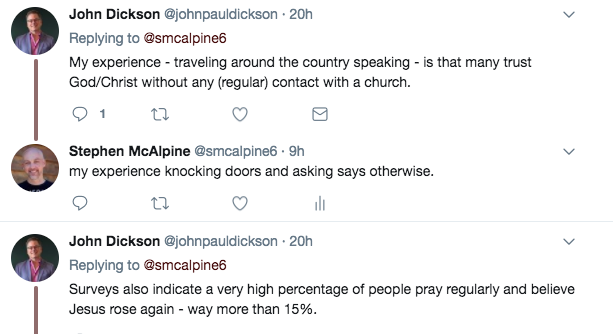June 30, 2017
Don’t Sex Up the Christian Stats in Australia
A tweet by John Dickson this week that the real number of Christians in Australia is somewhere between the fifteen percent of recorded church attendees and the 51 per cent who ticked “Christian” on the recent census reminds me of the “sexing up” furore that hit the UK Blair Government back in 2003.
Back then the Government was accused of having overstated the case for the war in Iraq by “sexing up” a report, known as the September Dossier, making a case for war based on an exaggerated and unsubstantiated claim about the number of – or indeed the presence of – weapons of mass destruction held by Saddam Hussein.
The scandal resulted in the suicide of a senior British official who blew the whistle on the “sexed up” claim. The war went ahead. Were weapons of mass destruction found? No they were not.
Well it’s not as drastic as all that, but here’s John’s tweet:

John says many quality things, has a keen eye for the culture and a knack for being good humoured and incisive in the public square. He’s an optimist when it comes to the Christian place in the secular frame. I admire all that. So much so that I can’t let this go through to the ‘keeper, as we say in Oz.
I tweet rarely, but I tweeted back:

He countered, I counter-countered:

A few others chimed in and it was all very civil which, if you believe in The Force, nicely balances the dark side of Trump’s tweets of recent days.
Anyway, enough of mixing my spiritual metaphors. I simply can’t see how we could accept the conclusions John is suggesting. Or at least we have to reach other conclusions about what we think it means to be Christian if we do accept them.
So for a start, the “somewhere between” might land us halfway; somewhere in the realm of 33 per cent. One third of the Australian population is Christian? For a start that would be of Great Awakening proportions. It would usher in the type of social change that the England of the Wesleyan Revivals brought about. In short we would, if that figure were the ballpark, see something happening in our country, something strange and exciting and God-focussed, a shift in societal desires and focuses. At the very least we would see a steadying of the Christian ship, which is taking something of a battering in the public square at the moment.
In fact we see much the opposite. It’s easy to dismiss the trend away from the Christian faith as merely a wishful projection of progressive liberal elites. But when we look closer we realise that the issues that garner so much oxygen in the Christian blogosphere etc, have next to no traction in the wider culture.
And so, not only do we not see this sort of revivalist recovery, we see a trend away from even discussing the gospel among our work colleagues and non-Christian friends, and a thinning out of both involvement within the Christian community called church, along with a less “sticky” Christian ethic among those who do adhere.
So while Julia Baird helpfully reminds us in yet another tweet that contra many claims “No Religion” is not the biggest religious grouping in Australia because Christianity is split up into denominations, if we were to factor in “no interest in attending anything Christian or even talking about it” then I am pretty sure that a huge chunk of that 51 per cent Christian would plummet. It’s how you ask the questions, right?
I am also not convinced that John’s tweet above (“a very high percentage of people pray regularly and believe Jesus rose again”), should give us confidence that we’re knocking it out of the park evangelistically. And it’s worth noting that the Sydney Anglican Diocese – a diocese which John is a part of – promoted a campaign to have ten percent of the Sydney population in attendance in “Bible-based churches” in the decade of the noughties, – a five-fold increase. To their credit they did not “sex up” the figures, because it certainly didn’t happen.
Now John makes the point many believe without going to church. Which, for me, means they believe without serving, giving, praying in community and for the community, loving other believers in community, sitting under the Word, taking the sacrament, submitting to church discipline, considering going into ministry. In other words, the exact opposite of what Jamie Smith would consider “belief” in that he says we are shaped more by what we do than by what we know.
In other words, all of the day to day hallmarks of a disciple of Jesus Christ are missing. Perhaps that comes down to definitions, but having exhausted ourselves in the evangelical world this past fifteen to twenty years pointing out that the key mark of the Christian is discipleship, of which evangelism is a subset, then John’s tweet appears to remove any meaningful discipleship engagement from the definition of what a Christian is.
At the very time we’re facing a harder secular frame; at the very time we’re girding our loins for counter-cultural discipleship in a way we haven’t experienced before, John’s definition pushes in the other direction.
The first crucial (actually and specifically crucial) credal statement: Jesus is Lord, seems to be missing too, the tip of a huge iceberg that, in its day, sank all attempts to co-opt the gospel onto the pagan template, and continues to sink all attempts to this day.
I do think that John, as a public Christian figure, who goes in to bat for all of us bravely and often, wants to ensure that there is still enough ground in that public square for us to operate from. But perhaps we have to gird our loins a little and admit the space is a lot smaller than we wish it to be. But to do so will require a cognitive shift in what we think the task ahead of us is.
And perhaps John is foreseeing the arguments, the likes of which we saw in the Sydney Morning Herald this week, in which the census figures showing Christianity’s overall numerical decline were used to push for an “end to Christian bias” , meaning an end to public funding of Christian schools, organisations, along with the tax breaks ecclesiastical groups enjoy. It’s one thing to sex up the stats. It’s another to sex them down. Mind you, there’s every chance, with the Herald’s decline in freefall, that its own rather shameful bias in Australia will have ended long before Christianity’s has.
Incidentally The Herald headline read The message in the Census: End Australia’s Christian bias, proving that whatever position you wish to take, the census has a message you can utilise for your own purposes and from your own perspective.
But again that’s my point. Perhaps John’s tweet is a way of taking back ground from the post-Christian progressive narrative. And while that is a good thing, I am not sure it’s all that productive. This is maybe where he and I differ on our perspective of how the church can move forward in this “age of upheaval” as Melbourne pastor and cultural critic Mark Sayers puts it in his latest book, the eminently readable Strange Days.
Mark notes how much of the re-engagement with the Christian traditions, especially by the alt-right in the Western world, is less to do with a rediscovery of Christianity and more a desire for a return to Christendom. More a case of staking claims for tradition, blood and culture than gospel centred communities gathered around King Jesus. The kind of unbelievers and atheists who are Christian unbelievers and atheists as opposed to any other kind.
Mark – along with the likes of Rusty Reno in his book Resurrecting The Idea of A Christian Society – posits a return for the church to a transgressive community on the margins, speaking to the centre of culture without being at it. And, in showing my bias here, a claim that we’re still around one third of the nation, simply delays the necessary exile that needs to take place for the church to rediscover the power of having a clarion and urgent voice directed to the centre, rather than a bloated and privileged one from the centre.
Written by
There is no guarantee that Jesus will return in our desired timeframe. Yet we have no reason to be anxious, because even if the timeframe is not guaranteed, the outcome is! We don’t have to waste energy being anxious; we can put it to better use.
Stephen McAlpine – futureproof
Stay in the know
Receive content updates, new blog articles and upcoming events all to your inbox.


